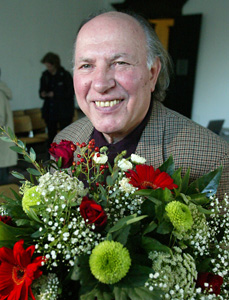Kertész, Imre, << KER tehs, ihm RAY >> (1929-2016), a Hungarian novelist, won the 2002 Nobel Prize in literature. He was the first Hungarian author to win the literature prize. Kertész’s fiction reflects his experiences in Nazi concentration camps during World War II (1939-1945) and also under Communist dictatorship in Hungary after the war. The Swedish Academy, which awarded the prize, cited Kertész “for writing that upholds the fragile experience of the individual against the barbaric arbitrariness of history.”

Kertész was born in Budapest, Hungary, on Nov. 9, 1929. A Jew, he was deported to the Nazi concentration camp of Auschwitz in German-occupied Poland in 1944 during a Nazi roundup of Hungarian Jews. He was later moved to the concentration camp of Buchenwald in Germany. He was liberated from that camp in 1945. He returned to Hungary and worked as a journalist from 1948 to 1951, when he was dismissed from his newspaper after it adopted the Communist Party line. For much of his life, Kertész supported himself as a free-lance writer and translator.
Kertész became best known for a quartet of novels that deal with his wartime experiences. The first of the four novels, Fateless, was published in 1975. The book is narrated by a 14-year-old Hungarian Jewish boy who learns to survive in a concentration camp. The second and third novels are Fiasco (1988) and Kaddish for a Child Not Born (1990). The fourth novel, Liquidation (2004), tells the story of a writer born in Auschwitz who takes his own life after realizing he will never understand why he survived or how Auschwitz could have existed.
Kertész also wrote two fictional diaries, Galley Diary (1992) and I—Another: Chronicle of a Metamorphosis (1997), and a memoir, Dossier K. (2006). His lectures and essays were published as The Holocaust as Culture (1993). Kertész translated the works of several German and Austrian thinkers into Hungarian, including Sigmund Freud, Friedrich Nietzsche, Arthur Schnitzler, and Ludwig Wittgenstein. Kertész died on March 31, 2016.
